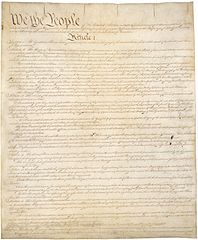Next month, Massachusetts voters will decide on a ballot measure seeking to cap corporate spending in elections. Ballot Question 2, if passed, will create a commission made up of citizens tasked with producing a report on the state of political […]
 Next month, Massachusetts voters will decide on a ballot measure seeking to cap corporate spending in elections.
Next month, Massachusetts voters will decide on a ballot measure seeking to cap corporate spending in elections.
Ballot Question 2, if passed, will create a commission made up of citizens tasked with producing a report on the state of political spending in Massachusetts and promoting an amendment to the United States Constitution. The commission would also report on whether the state can legally limit corporate contributions.
The ballot measure has been characterized as a way for the state to show their opposition to the Supreme Court’s 2010 Citizens United decision.
The group advocating for Ballot Question 2 envisions a 28th Amendment removing the ability of corporations, labor unions, super PACs and other wealthy interests from financially influencing political campaigns.
To pass, an amendment to the U.S. Constitution would require approval by two-thirds of the U.S. House and Senate and must also be ratified by 38 states.
January 4, 2017 •
Cruz and DeSantis Propose Term Limit Constitutional Amendment
On January 3, U.S. Sen. Ted Cruz and U.S. Rep. Ron DeSantis proposed an amendment to the U.S. Constitution to impose term limits on members of Congress. The amendment would limit Senators to two six-year terms and House members to […]
 On January 3, U.S. Sen. Ted Cruz and U.S. Rep. Ron DeSantis proposed an amendment to the U.S. Constitution to impose term limits on members of Congress. The amendment would limit Senators to two six-year terms and House members to three two-year terms.
On January 3, U.S. Sen. Ted Cruz and U.S. Rep. Ron DeSantis proposed an amendment to the U.S. Constitution to impose term limits on members of Congress. The amendment would limit Senators to two six-year terms and House members to three two-year terms.
In a press release, Cruz states, “The time is now for Congress, with the overwhelming support of the American people, to submit this constitutional amendment to the states for speedy ratification.”
The election of a person filling a vacancy in the House would be counted as one term if the person fills the vacancy for more than one year. In the Senate, the vacancy would have to be filled for more than three years to be counted.
State and Federal Communications, Inc. provides research and consulting services for government relations professionals on lobbying laws, procurement lobbying laws, political contribution laws in the United States and Canada. Learn more by visiting stateandfed.com.


